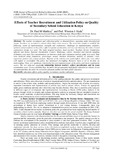Effects of teacher recruitment and utilization policy on quality of secondary school education in Kenya
Abstract
The teacher recruitment and utilization policy is demand-driven, operating under decentralized system. Teachers are recruited in schools where there exists vacancy. The researcher sought to establish the following: extent of implementation; strengths and weaknesses; challenges in implementation; attitudes, opinions and perceptions on the policy; effect on quality of education; and ways of enhancing the policy. Causal comparative design was used. The study targeted teachers, head teachers, Teachers Service Commission officials and Kenya National Examination Council. Multistage, cluster, stratified and random sampling techniques were used. Two questionnaires, an interview guide and a document analysis guide were used. Data were analyzed using frequencies, percentages, means, standard deviations, analysis of variance, t-test, regression analysis and content analysis. Majority of the schools were understaffed, while a few were either well staffed or overstaffed. The policy has minimized overstaffing. However, more is yet to be done on understaffing. There was significant relationship between implementation of the policy and mean examination scores. The test indicated significant relationship between teachers’ subject specialization and the mean examination scores. It was concluded that, the policy did not guarantee high quality education in schools. It was recommended that, the policy be revised for adequate staffing and high quality education.
Citation
Maithya, Paul M., and Winston J. Akala. "Effects of Teacher Recruitment and Utilization Policy on Quality of Secondary School Education in Kenya." (2005).Publisher
University of Nairobi
Collections
- Faculty of Education (FEd) [1042]

